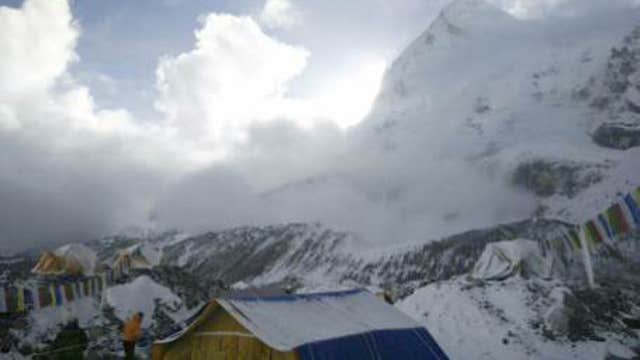Nepal Quake's Economic Toll Expected to be Massive
As foreign aid flows into Nepal, hit over the weekend by a devastating earthquake, it will be put to work to rebuild one of the world's poorest nations.
The economic toll of the 7.8-magnitude quake, which struck Saturday and killed at least 3,200 people, and which is being followed by myriad aftershocks, is likely to be immense.
The U.S. Geological Survey estimates losses could exceed the landlocked mountain state's $20 billion annual gross domestic product. Rajiv Biswas, an analyst with the Eurasia Group, a New-York based political-risk firm, puts the rebuilding cost at $5 billion over the next five years.
The disaster wiped out buildings in the capital, Katmandu, and transportation infrastructure across the country has been laid to waste. There are fears the quake may have wrought damage on hydroelectric power projects in the Himalayas, close to the epicenter.
Power outages, more prolonged than normal, hit Katmandu on Monday. Crucial foreign investment, including plans for a $1.6 billion hydroelectric dam in the Himalayas involving Chinese money, could be put on hold, experts say.
And tourism, the nation's lifeblood, employing over a million people, or about 7% of the workforce, and accounting for about 8% of the economy, will take a hit in the near term, as high-end hikers and backpackers cancel vacations.
But the role of foreign aid could have an outsize impact on such a small country, some observers say. Aid pledges started pouring in Monday, with the Asian Development Bank, a regional multilateral lender, pledging $200 million to fund the first phase of rehabilitation.
It was unclear how much the United Nations will seek in aid during the emergency phase, but donations are likely to total in the hundreds of millions. So far, foreign aid to help rebuild after Typhoon Haiyan in the Philippines in 2013 has reached $844 million, according to the U.N. Such funds could go a long way in Nepal.
"The only advantage they have is that the size of their economy is small relative to donors' capacity," Mr. Biswas said.
The question now is whether Nepal's government is in a position to oversee a complex reconstruction process. The country has been riven for years by political discord, as factions fight over the drawing up of a new constitution, nearly a decade after a peace deal ended a decadeslong Maoist insurgency.
Some economists believe reconstruction after natural disasters can usher in a period of better economic growth, as infrastructure is built back better in developing countries. Chinese authorities claimed this outcome after the Sichuan earthquake in 2008.
Others say there is little empirical evidence to support such claims, as any positive impact from aid is negated by destruction of factories, private property and other infrastructure. In Haiti, another small economy which suffered a devastating earthquake five years ago, some $3.5 billion in aid has failed to turn the country around; political violence and disease is still common.
"It's not only money that you need for reconstruction, but also human knowledge and a functioning government," said Ilan Noy, an expert on the economics of disasters at the Victoria University of Wellington in New Zealand. "Nepal belongs to a category of countries where it's unclear whether the ability to execute reconstruction will be sufficient."
Nepal's GDP per capita was only $694 in 2013, making it poorer than Mali and Burkina Faso. The economy, which grew only about 4% last year, much slower than neighboring India's 7% rate, relies on its oversees workers, whose remittances account for about a third of the economy. Unemployment is 40%, with many people eking out a living in agriculture and trading.
It is too early to total the damages from the earthquake, said Hun Kim, head of the South Asian department at the Asian Development Bank. "If this was a flood or a tsunami, it would be over by now. But as long as the aftershocks continue, we can't start the damage assessment," Mr. Kim said. The bank, he added, is relying on other donor agencies like the World Bank and U.N. for information, because the government in Katmandu is unable to provide any.
The International Monetary Fund stands ready to give Nepal balance-of-payment support to underpin the country's economic stability, said Thomas Richardson, the fund's representative in New Delhi. That could be crucial as Nepal runs a large trade deficit and relies on tourism and remittances for foreign exchange. The Nepalese rupee, which is pegged to India's currency, was under pressure even before the earthquake, sparking inflation.
Politics is likely to continue to complicate the nation's destiny. Some observers say Nepal's failure to agree on a new constitution in recent years, due to its long-running political crisis, is likely to complicate post-disaster management.
"The earthquake will bring negotiations to a standstill," said Nihar Nayak, an associate fellow with the Institute for Defence Studies and Analyses in New Delhi. "Reconstruction can only be more difficult with a broken political system."
Biman Mukherji contributed to this article.




















